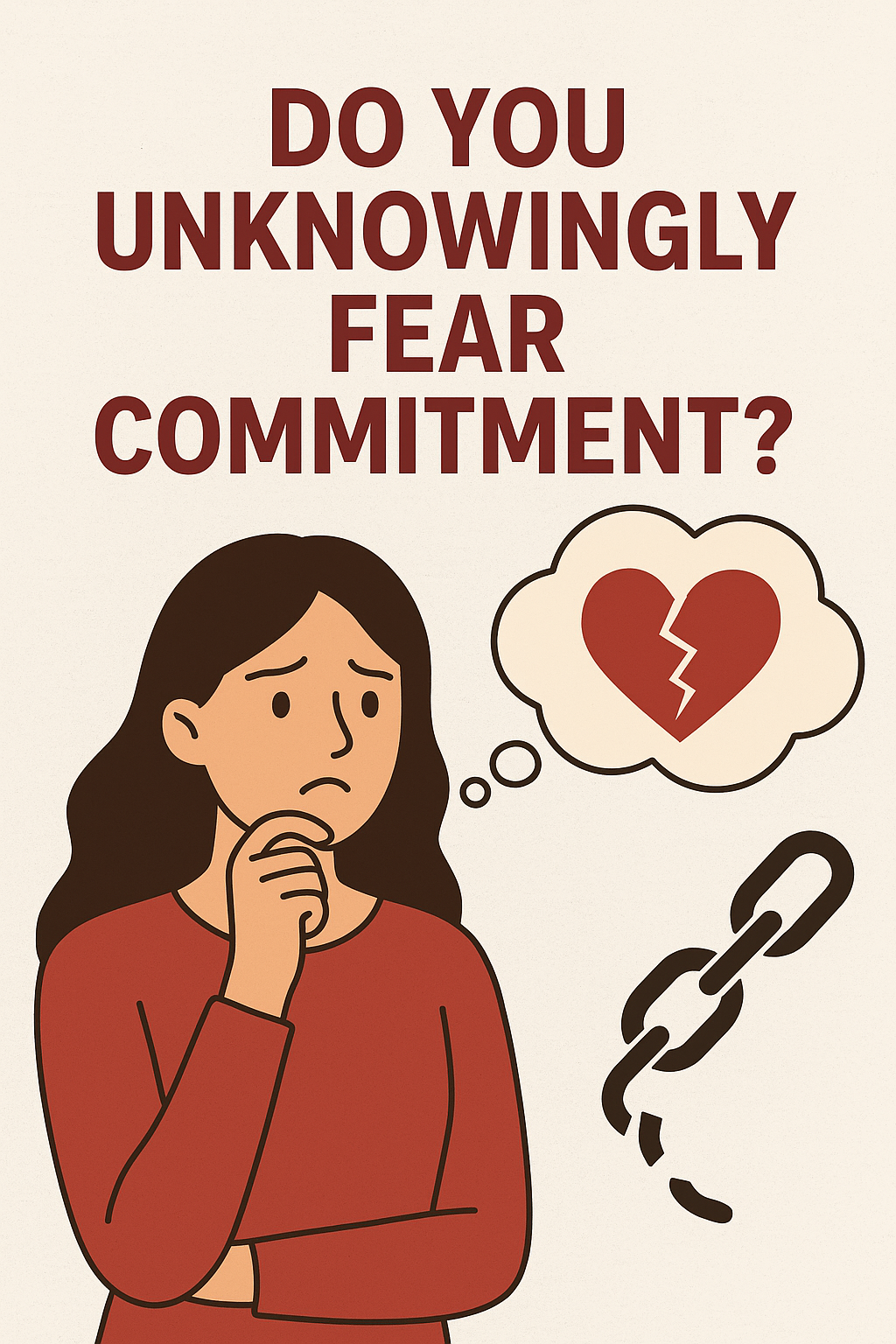Do You Unknowingly Fear Commitment?
Do You Unknowingly Fear Commitment?
A Complete Guide to Understanding and Overcoming It

Introduction
Commitment. For some, this word brings feelings of safety, stability, and long-term happiness. For others, it triggers anxiety, doubts, or even a desire to escape. Fear of commitment is not something unusual—it is far more common than most people realize. Many individuals walk through life without realizing that their struggles in relationships, career decisions, or even simple long-term planning stem from an underlying commitment issue.
But here’s the real question: Could you unknowingly fear commitment?
The truth is, fear of commitment does not always appear as an obvious refusal to get married or settle down. It often hides behind excuses, repeated relationship failures, self-sabotage, or avoidance of important life choices. In this article, we will explore the deep layers of commitment fear—why it happens, how to identify it, and most importantly, how to overcome it so that you can build healthier relationships and a more fulfilling life.
This is not just another surface-level blog post. By the end of this article, you will have a clear understanding of:
- The psychology behind commitment fear
- Hidden signs that you might unknowingly fear commitment
- How this fear impacts relationships, career, and personal growth
- Practical steps to face and overcome commitment issues
- Ways to build trust, stability, and long-term happiness
Chapter 1: What Does Fear of Commitment Really Mean?
Fear of commitment, also known as commitment phobia, refers to the difficulty or resistance someone feels toward making long-term promises or sticking to stable plans. Most people associate it with romantic relationships—like being afraid to get married or avoiding labels such as “boyfriend” or “girlfriend.” But commitment fear can manifest in many areas of life.
- In relationships: Difficulty settling into a long-term partnership or marriage.
- In career: Avoiding long-term jobs, skipping promotions, or resisting responsibilities.
- In personal life: Struggling to commit to buying a house, planning children, or even keeping a gym membership.
At its core, commitment fear is not about disliking stability. Rather, it is about the anxieties and insecurities attached to long-term attachment.
Chapter 2: Why Do People Develop Fear of Commitment?
Commitment fear does not appear out of nowhere. It is usually rooted in deeper psychological or social experiences. Some of the common causes include:
1. Past Trauma or Heartbreak
If someone has experienced betrayal, abandonment, or a painful breakup, they may unconsciously build a defense wall to avoid repeating the same pain.
2. Childhood Experiences
People who grew up in unstable families, witnessed parental divorce, or experienced neglect may find it harder to trust that long-term stability is possible.
3. Fear of Losing Freedom
Some individuals equate commitment with losing personal independence. They fear being “trapped” in a life where they can no longer make choices freely.
4. Perfectionism & Unrealistic Expectations
Perfectionists often avoid commitment because they are afraid the relationship or job will not be “perfect.” Instead of risking disappointment, they avoid long-term bonds altogether.
5. Low Self-Esteem
When people doubt their worth, they may secretly fear that they are not “good enough” to sustain a committed relationship.
6. Societal Pressure
In some cultures, marriage and long-term planning are heavily pressured. This pressure can create resistance and fear instead of comfort.
Chapter 3: Hidden Signs You May Unknowingly Fear Commitment
Many people believe they are ready for commitment, but their actions tell a different story. If you relate to several of the following signs, you might unknowingly struggle with commitment fear.
1. You Avoid Defining Relationships
You may enjoy spending time with someone, but when the conversation about “where this is going” arises, you feel discomfort or give vague answers.
2. You Always Find Flaws in Others
Instead of focusing on connection, you focus on why the person is not “perfect.” This may be an unconscious strategy to avoid deepening the relationship.
3. You Feel Trapped Easily
Even when in a happy relationship, you may feel suffocated at the thought of long-term obligations.
4. You Keep Relationships Short-Term
Patterns like ending things just as they get serious might be a sign of unconscious commitment fear.
5. You Prioritize Career or Freedom as an Excuse
While career focus is not bad, sometimes people use it as a shield to avoid emotional vulnerability.
6. You Struggle With Trust
If trusting someone long-term feels unsafe, it may be tied to commitment issues.
7. You’re Attracted to “Unavailable” People
If you often fall for people who are married, distant, or emotionally detached, it may be because deep down you don’t want true commitment either.
Chapter 4: How Fear of Commitment Impacts Relationships
Commitment fear doesn’t only affect you—it deeply impacts your partners as well. Here’s how:
- Uncertainty & Anxiety: Your partner may constantly wonder about your true intentions.
- Repeated Breakups: Relationships may never reach their full potential.
- Emotional Distance: Even if you’re physically present, emotional intimacy might be lacking.
- Trust Issues: Partners may feel unloved or insecure due to your reluctance to commit.
- Marriage Struggles: Fear of commitment can delay marriage, cause fights, or even lead to divorce.
Ultimately, avoiding commitment creates a cycle of temporary happiness and long-term dissatisfaction.
Chapter 5: Fear of Commitment Beyond Romantic Relationships

Commitment fear is not limited to love life. It can spill over into other areas:
Career
- Avoiding long-term jobs.
- Rejecting promotions due to responsibility fears.
- Frequently changing industries.
Friendships
- Struggling to maintain deep, lasting friendships.
- Preferring surface-level connections.
Personal Goals
- Starting new projects but rarely finishing them.
- Avoiding decisions like home ownership, moving cities, or having children.
This proves that commitment fear is more of a life mindset than just a relationship issue.
Chapter 6: The Psychology Behind Commitment Fear
Psychologists often connect commitment fear with two key concepts:
- Attachment Theory – People with avoidant attachment styles often resist closeness, preferring independence over intimacy.
- Fear of Vulnerability – Commitment requires emotional exposure, and fear of being hurt makes people retreat.
In simpler terms: people fear commitment because they fear losing control, getting hurt, or being disappointed.
Chapter 7: How to Overcome Fear of Commitment
The good news is: fear of commitment is not permanent. With awareness and effort, you can overcome it.
Step 1: Acknowledge the Fear
The first step is admitting that commitment scares you. Self-awareness is powerful.
Step 2: Reflect on the Root Cause
Ask yourself: Why do I fear commitment? Is it past heartbreak, family patterns, or fear of losing freedom?
Step 3: Challenge Negative Beliefs
Replace thoughts like “Commitment means losing myself” with “Commitment means growth and shared happiness.”
Step 4: Take Small Steps
Start with smaller commitments—like sticking to a hobby or goal—before tackling big commitments like marriage.
Step 5: Communicate Honestly
If you’re in a relationship, share your fears with your partner. Transparency builds trust.
Step 6: Seek Therapy or Counseling
Sometimes, deep-rooted fears require professional help.
Step 7: Practice Vulnerability
Allow yourself to be open and emotionally available. Vulnerability is the foundation of intimacy.
Chapter 8: Building a Healthy Relationship With Commitment
True commitment is not about restriction—it’s about shared growth. To build a healthy relationship with commitment:
- See it as partnership, not prison.
- Balance independence with togetherness.
- Celebrate small milestones.
- Remind yourself that stability brings peace, not boredom.
Chapter 9: Success Stories – Overcoming Commitment Fear
Story 1: From Breakups to Marriage
One man avoided relationships for years, fearing he would be “trapped.” After therapy and small steps, he realized commitment meant sharing life, not losing it. Today, he is happily married.
Story 2: The Career Jumper
A woman who constantly switched jobs realized she feared responsibility. After working with a mentor, she embraced a stable role and flourished.
These stories prove: overcoming commitment fear leads to stability, peace, and lasting happiness.
Chapter 10: Final Thoughts
Commitment is not about losing freedom—it’s about choosing stability, love, and growth. Many people unknowingly fear commitment, but the good news is that fear does not have to control your life.
If you notice the signs in yourself, remember: it’s never too late to change. Whether in love, career, or personal goals, embracing commitment leads to deeper satisfaction.
So, ask yourself again: Do you unknowingly fear commitment?
If the answer is yes, it’s time to confront it—because your best life is waiting on the other side of fear.
Chapter 11: Self-Reflection – Do You Really Fear Commitment? (Practical Test)
Sometimes, people don’t realize their own patterns until they pause and reflect. A good way to identify commitment issues is through self-reflection exercises. Below is a simple self-test:
Commitment Self-Assessment Quiz
Answer each statement with:
- Always
- Sometimes
- Never
- I feel anxious when someone asks about the future of a relationship.
- I often break things off when they start getting serious.
- I prefer “keeping things casual” rather than defining relationships.
- I worry that long-term commitments will take away my freedom.
- I am attracted to people who are emotionally or physically unavailable.
- I avoid making long-term plans in both relationships and personal goals.
- When things get too comfortable, I feel bored or restless.
- I often justify leaving by saying, “I’m not ready.”
- I struggle with trusting people fully.
- I tend to over-focus on flaws rather than appreciating positives.
Scoring
- Mostly Always: You likely have strong commitment fears that affect your relationships and decisions.
- Mostly Sometimes: You show mild to moderate fear, but with awareness, you can manage it.
- Mostly Never: You probably don’t struggle with commitment fear, but self-reflection can still help.
This quiz is not a clinical diagnosis, but it gives you an idea of where you stand.
Chapter 12: Daily Practices to Reduce Commitment Fear
Overcoming fear of commitment doesn’t happen overnight. It requires consistent effort and small changes in mindset. Here are some daily practices that can help:
- Journaling
Write down your thoughts and feelings about commitment. Ask yourself:
- What do I fear most about long-term relationships?
- What past events shaped my beliefs about stability?
This helps bring unconscious fears to the surface.
- Affirmations
Start your day with positive affirmations such as:
- “Commitment brings me growth, not restriction.”
- “I am worthy of love and stability.”
- “I can be both free and committed.”
Repeating these daily helps reprogram your mindset.
- Mindfulness & Meditation
Fear often comes from overthinking the future. Practicing mindfulness allows you to live in the present, which reduces anxiety about long-term decisions.
- Practice Small Commitments
If the idea of marriage or a career contract feels overwhelming, start smaller:
- Commit to reading a book every month.
- Commit to a 30-day fitness challenge.
- Commit to regular check-ins with a friend.
As you build confidence with small commitments, bigger ones become less intimidating.
- Open Communication
If you’re in a relationship, don’t hide your fears. Communicate with your partner honestly. You may be surprised at how much support you receive.
Chapter 13: How Partners Can Support Someone With Commitment Fear
If you’re dating or married to someone with commitment issues, you might feel frustrated or insecure. Here are ways you can provide support without pushing too hard:
- Be Patient, But Set Boundaries
Understand that your partner’s fear is not about you, but don’t compromise your own needs for stability. - Encourage, Don’t Pressure
Forcing commitment often backfires. Instead, gently encourage small steps. - Focus on Trust-Building
Show consistency and reliability. Small actions of trust can make a big difference. - Avoid Ultimatums
Instead of “Commit or leave,” explain how their actions affect you emotionally. Create a safe space for open conversation. - Suggest Professional Help
Sometimes, therapy is the best way forward. Suggesting counseling should not be seen as weakness but as a step toward healing.
Chapter 14: The Rewards of Embracing Commitment
When you overcome fear of commitment, the rewards are life-changing:
- Stronger Relationships: You build lasting love and intimacy.
- Personal Growth: Commitment forces you to grow and evolve.
- Peace of Mind: No more running from stability—you embrace it.
- Sense of Purpose: Long-term goals give life deeper meaning.
- Security: Commitment provides emotional and practical stability.
Instead of thinking of commitment as a loss of freedom, see it as a path to deeper joy and fulfillment.
Extended Conclusion
Commitment fear is not a weakness—it is a human response to past pain, uncertainty, and fear of vulnerability. But avoiding commitment only keeps you stuck in cycles of temporary connections and unfinished goals.
When you face this fear, you gain more than just stable relationships—you gain clarity, growth, and long-lasting happiness.
So, the next time you ask yourself: “Do I unknowingly fear commitment?” — don’t stop at the question. Take action. Reflect. Heal. And open yourself up to the possibility of love, trust, and meaningful stability.
Because life becomes richer, relationships become deeper, and happiness becomes more real when you embrace commitment instead of running from it.
Unmasking the Fear: Do You Unknowingly Fear Commitment?

We’ve all heard the phrase, “They have commitment issues.” It’s often tossed around casually to describe someone who avoids long-term relationships, career paths, or even making dinner plans a week in advance. But what if the fear of commitment isn’t always a conscious decision? What if it’s a subtle, deeply ingrained pattern that you’re not even aware of? This insidious, subconscious fear can sabotage your relationships, stifle your career growth, and leave you feeling stuck and unfulfilled. So, let’s explore the hidden signs of commitment phobia, its root causes, and how you can begin to confront and overcome it.
The Subtle Signs of Unconscious Commitment Phobia
The fear of commitment doesn’t always look like running for the hills the moment a relationship gets serious. Often, it’s far more nuanced and sneaky. Here are some less obvious signs that you might be unknowingly afraid of commitment:
- The “What If” Mindset: You’re in a great relationship, but your mind is constantly fixated on the “what ifs.” What if someone better comes along? What if I’m not truly happy? This constant questioning prevents you from fully investing in the present and enjoying the connection you have. It’s a mental escape hatch, always looking for a reason to leave before you get too comfortable.
- A Habit of Sabotage: You find yourself creating problems where none exist. Maybe you start an argument over something trivial, withdraw emotionally, or flirt with other people. These actions, often unintentional, serve to create distance and prevent the relationship from deepening. It’s a self-fulfilling prophecy: you create the instability you fear.
- The “Always Waiting for the Other Shoe to Drop” Feeling: You’re always on high alert, expecting things to go wrong. When your partner is kind or the relationship is going smoothly, you’re suspicious rather than grateful. This hyper-vigilance is a defense mechanism to protect you from the pain of a potential future breakup, but it also prevents you from experiencing genuine trust and intimacy.
- Keeping Your Options Open (and Your Feelings Guarded): You have a series of short-term relationships or “situationships” that never progress to a more serious stage. You might be emotionally unavailable, making it difficult for anyone to get close. This isn’t because you’re a bad person; it’s because you’re unconsciously protecting yourself from the vulnerability that comes with true connection.
- A Pattern of Flaws: You tend to be overly critical of your partners, focusing on their minor imperfections. One person is “too clingy,” another is “not ambitious enough,” and a third “has a weird laugh.” While everyone has preferences, a consistent pattern of finding deal-breakers in otherwise healthy relationships can be a sign that you’re looking for a reason to escape commitment.
- The “Future-Focused” Procrastinator: In your career, you’re always talking about your five-year plan but never taking the concrete steps to get there. You’re drawn to new jobs and opportunities but quickly lose interest once the initial excitement wears off. This mirrors the pattern in your relationships: the idea of the future is exciting, but the hard work of building something in the present feels too daunting.
- Difficulty with Defining the Relationship (DTR): You panic when your partner asks, “What are we?” or wants to discuss your future together. You might deflect, change the subject, or give a vague answer. This avoidance isn’t about not caring; it’s about the overwhelming pressure you feel when faced with the finality of a label or a defined future.
The Deep Roots of Commitment Phobia
Understanding the “why” behind your fear is the first step toward healing. The roots of commitment phobia are often complex and deeply personal. They’re not a moral failing; they’re a psychological response to past experiences.
- Traumatic Past Relationships: A history of betrayal, infidelity, or painful breakups can make you wary of trusting anyone again. Your brain, in a protective measure, learns to associate commitment with pain, leading you to subconsciously avoid it.
- Childhood Wounds: The most profound fears often stem from our earliest experiences. A child who witnessed their parents’ divorce, a parent’s emotional abandonment, or a chaotic family life may grow up believing that relationships are inherently unstable and unsafe.
- Fear of Losing Your Identity: For many, commitment feels like a loss of self. You may worry that you’ll have to give up your hobbies, friends, or freedom to be in a serious relationship. This fear is especially common in individuals who have a strong sense of independence and identity.
- Fear of Making the “Wrong” Choice: In a world of endless options, the pressure to choose the “right” partner or career path can be paralyzing. The fear of making a mistake and being stuck with a bad decision can make you avoid making any decision at all. This is a form of analysis paralysis, where you’re so busy weighing every possible outcome that you never take the leap.
- A Lack of Secure Attachment: Secure attachment is the feeling that you can rely on and trust others. If you didn’t develop this in childhood, it can be incredibly difficult to form a secure bond in adulthood. You may subconsciously push people away because deep down, you don’t believe they will stay.
How to Begin the Journey Toward Commitment
Recognizing the signs is the first, and arguably the most difficult, step. The journey toward overcoming commitment phobia is a process of self-discovery and gradual change.
- Practice Self-Awareness: Start by paying attention to your patterns. When you feel the urge to pull away, ask yourself: What am I feeling right now? What am I afraid of? Journaling can be a powerful tool for uncovering these unconscious fears.
- Challenge Your Beliefs: Identify the negative beliefs you hold about commitment (e.g., “Relationships are doomed to fail,” “I will lose myself”). Then, actively challenge them. Is this belief truly a fact, or is it a story you’ve been telling yourself based on past pain?
- Start Small: Commitment doesn’t have to be a monumental leap. Practice small commitments in your daily life. Commit to finishing a book, taking a class, or meeting a friend for coffee next week. These small acts build your trust in your own ability to follow through.
- Communicate with Your Partner: If you’re in a relationship, be honest about your struggles (without making your partner responsible for fixing them). A supportive partner can provide reassurance and help you navigate these fears. This act of vulnerability is, in itself, a form of commitment.
- Seek Professional Help: A therapist or counselor can provide a safe space to explore the root causes of your fears and give you tools to build healthier patterns. They can help you work through childhood trauma, past heartbreaks, and the anxiety that comes with deep connection.
The fear of commitment isn’t a life sentence. It’s a roadblock that, once understood, can be overcome. By unmasking this hidden fear, you can stop sabotaging your own happiness and start building the meaningful, lasting relationships and life you truly desire. The first step is to be honest with yourself, and the rest will follow.








